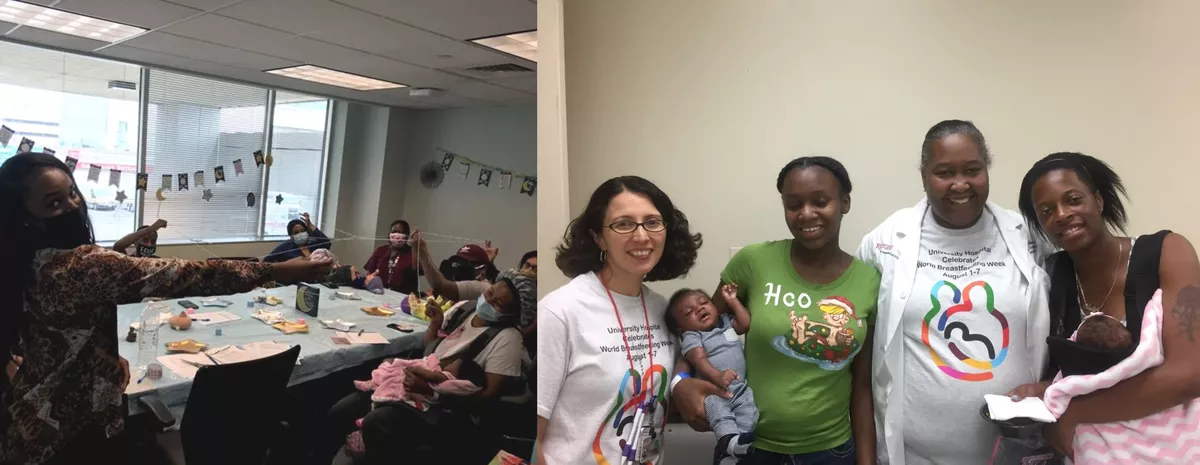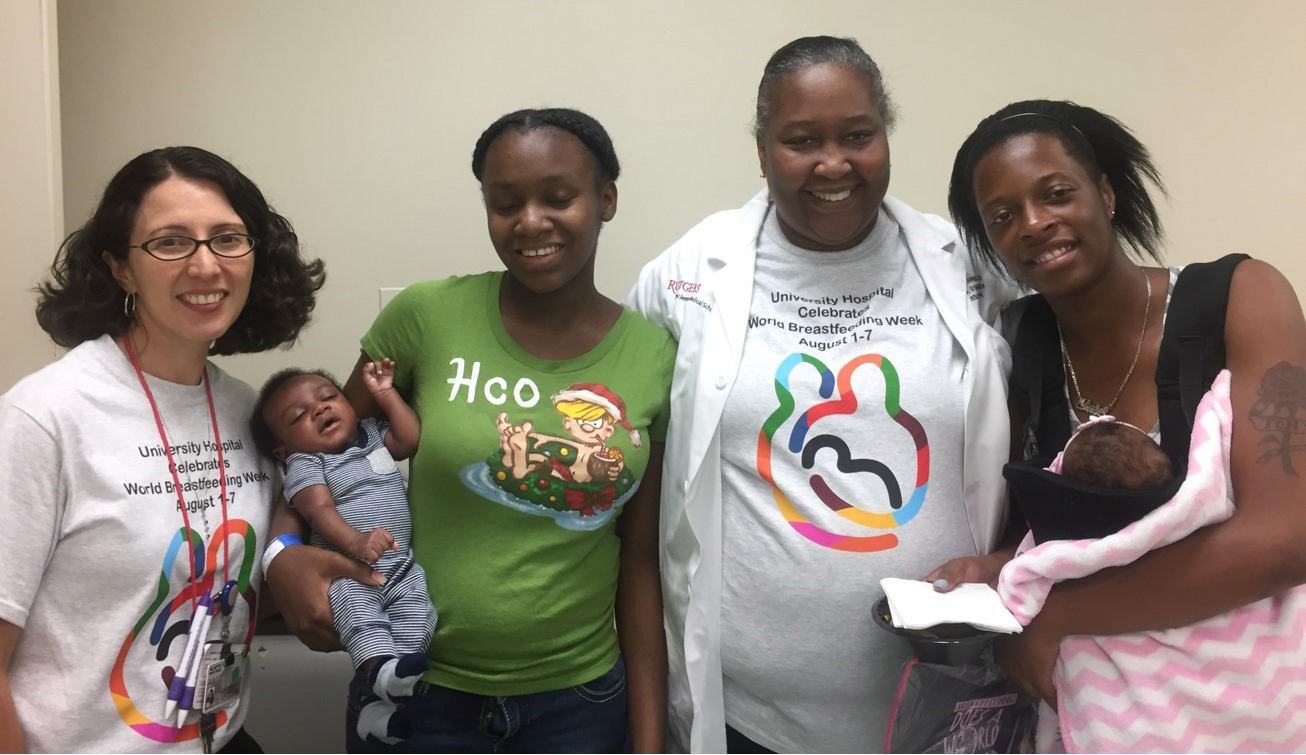👋 Welcome to Starting Early. Every other week, we spotlight new reports, useful news, engaging interviews with people doing important work in the field, and interesting takes on issues that matter.
We are honored to sit down this week with Dr. Damali Campbell. She is a physician in OB/GYN and Addiction Medicine at University Hospital in Newark – and a champion for Black women’s health. She filled us in on her team’s work at one of the largest safety net hospitals in the state, and talked about expanding CenteringPregnancy, a transformative health care model that aims to reach 50 new clinical sites in the next 5 years.
Read on and click the links to go deeper.
1. Launching a national search for Nurture NJ Director
Led by New Jersey first lady Tammy Murphy, the Nurture NJ strategic plan takes a “whole-government” approach to addressing maternal infant health – aiming to reduce the state’s maternal mortality rate by half over 5 years.
New Jersey has one of the widest racial disparities in the nation:
- A Black mother in New Jersey is 7 times more likely to die than a white mother from pregnancy complications.
- 47 women die, on average, for every 100,000 live births in New Jersey, compared to 20 nationally
“Black women have the worst maternal mortality rates in New Jersey, the state has among the worst rates in the country, and the country has among the worst rates in the world. So that puts us in a place where we need to focus on changing this,” said Vijaya Hogan, a perinatal epidemiologist at the UNC-Chapel Hill who consulted on the creation of Nurture NJ.
Funders take action 🎉: Inspired by the Nurture NJ plan focused on addressing equity, 5 foundations came together to form the NJ Birth Equity Funders Alliance. This public-private-community partnership is working to eliminate racial inequities in maternal and infant mortality and make sure New Jersey’s mothers and babies are safe and thriving. The partnership is recruiting for a Nurture NJ Director to lead statewide efforts to transform the systems and structures that support mothers and infants — working closely with pregnant women, leaders in government, community members and organizers, funders, and others.
New Jersey state government’s response to the maternal health crisis is supported by federal officials, such as New Jersey Senators Cory Booker and Bob Menendez, who introduced and are urging passage of these important pieces of legislation:
- The Black Maternal Momnibus Act contains 12 proposals to address social determinants of health and underlying causes of racial disparities, fund community-based health organizations, and expand the perinatal workforce.
- The bipartisan Tech to Save Moms Act seeks to close the digital divide in healthcare by bringing telehealth services to underserved communities, improve and expand care, combat implicit biases, and reduce disparities in maternal health.
2. Dispatches from the Field: Dr. Damali Campbell discusses caring for Black women and mothers

Meet Dr. Damali Campbell. As a Black physician serving mainly women of color, Dr. Campbell shares the importance of culturally congruent care and lessons learned in the context of the people she serves.
She is a champion of the group prenatal care model CenteringPregnancy. This transformative healthcare model brings 8-10 women due at the same time together in a comfortable group setting. The model gives women 10 times more time with their provider and enables them to benefit from connecting with other patients – impossible in traditional care.
“When I go into an individual patient’s room, I am the expert and they’re receiving the information. But within the group model, patients are not only asking questions, but also answering each other’s questions and providing their feedback.”
We discussed:
- How to reduce Black maternal mortality
- Empowering patients through healthcare innovations like CenteringPregnancy
- Diminishing patients’ reluctance to ask physicians medical questions
“When I talk to friends with whom I work out or go out to dinner, I’m amazed they’re not aware that even Black women who are college educated have an increased risk of complications. So I think that, across the board, we still have work to do around increasing awareness. On a local level and citywide level, people need to know what questions to ask. They need to be aware of what services are provided at facilities they use in their service area.”
Read the full interview here.
3. Join the Centering movement in New Jersey

Centering is changing healthcare delivery as we know it. This relationship-based model uniquely incorporates peer learning, community building, and social support to improve outcomes for moms, babies, and families.
- CenteringPregnancy brings 8-10 women due at the same time into a comfortable group setting for 90-minute to 2-hour visits with their providers.
- CenteringParenting brings 6-8 parents, support people, and their same-age infants together with their healthcare providers. Better attendance leads to higher immunization rates, extended breastfeeding, and additional opportunities to screen for maternal mental health.
The bottom line: Research shows the Centering model improves outcomes for mothers and babies and reduces racial health disparities in preterm births.
Recognizing the power of this approach, the Burke Foundation is expanding the model to more families and regions in New Jersey. This year, 10 new awards will be offered to help clinical practices implement 5 CenteringParenting sites and 5 CenteringPregnancy sites.
- Several counties have been identified as priority communities for expansion based on assessment of maternal and pediatric outcomes conducted by the New Jersey Healthcare Quality Institute. They include Camden, Essex, Hudson, Middlesex, Cumberland, and Monmouth.
Join Assistant Health Commissioner Lisa Asare, Dr. Amy Crockett, Centering moms, and a group of incredible panelists for a virtual event on October 6 to learn how Centering can benefit your practice, improve patients’ health, and support Nurture NJ.
Please share the application with your healthcare networks (deadline 11/12/21).
4. What our team is reading 📖

In between Zoom calls and site visits, our team often chats about books, articles, and podcasts that inspire our work. Here are some recent favorites:
“Costa Ricans Live Longer Than Us. What’s the Secret?” in The New Yorker
In a decade, Costa Rica reduced maternal deaths by 80%. By targeting dollars towards the most readily preventable kinds of death and disability, Costa Rica has not only surpassed America’s life expectancy while spending less on healthcare as a percentage income but has spent less than the world average.
How? Looking at life expectancy, they identified maternal and child mortality as the biggest source of the loss of years of life and made public health the center of medical care delivery.
- Small public health units were established to help prevent and manage the most frequent dangers among pregnant women. This paved the way for mobile units that now deploy a universal system of care.
A doctor, nurse, and community health worker now visit every household once a year – no matter the transportation barriers. They will take scooters off-road, show up by boat, and even ride horses to reach families. 🐎⛵🛵
What Happened to You? Conversations on Trauma, Resilience, and Healing by Oprah Winfrey and Dr. Bruce Perry
Changing the conversation from “What’s Wrong with You?” to “What Happened to You?” is at the heart of the work described in this book.
Oprah shares her personal stories of childhood trauma with vulnerability and courage in conversation with Dr. Perry, a neuroscientist and trauma expert. He provides an overview of his decades of research and work with children facing adversity and trauma, explaining how nurturing adults can buffer adversity in the lives and health of children.
This inspiring book will resonate with anyone whose lives touch children: parents, educators, coaches, police officers, and policymakers.
“So if we know that there are 50 million children who have experienced trauma, that means there are countless millions of adults carrying that hurt through their lives, their jobs, their relationships, and then passing it on to their children. And those adults may not even realize what happened to them.” – Oprah Winfrey

